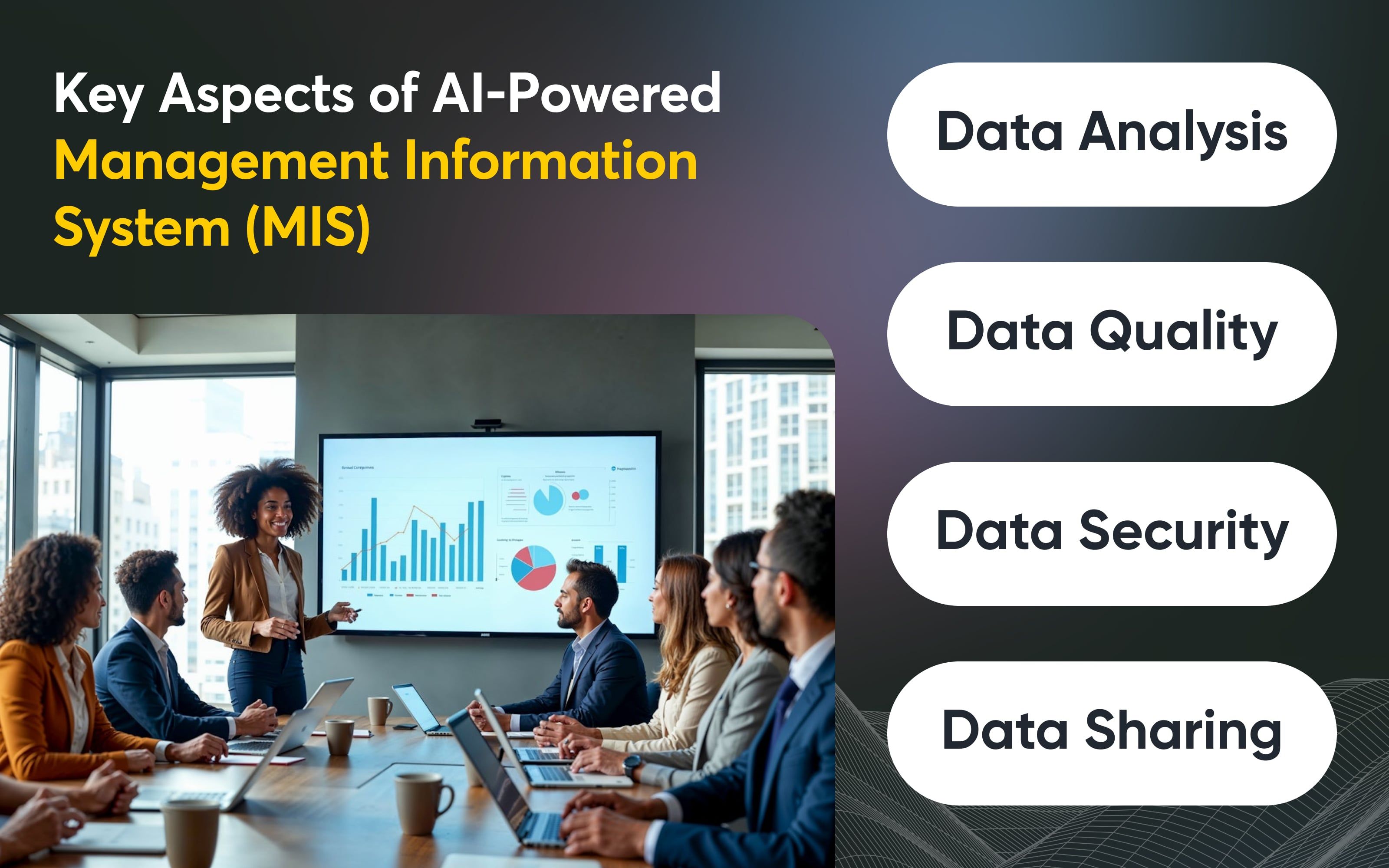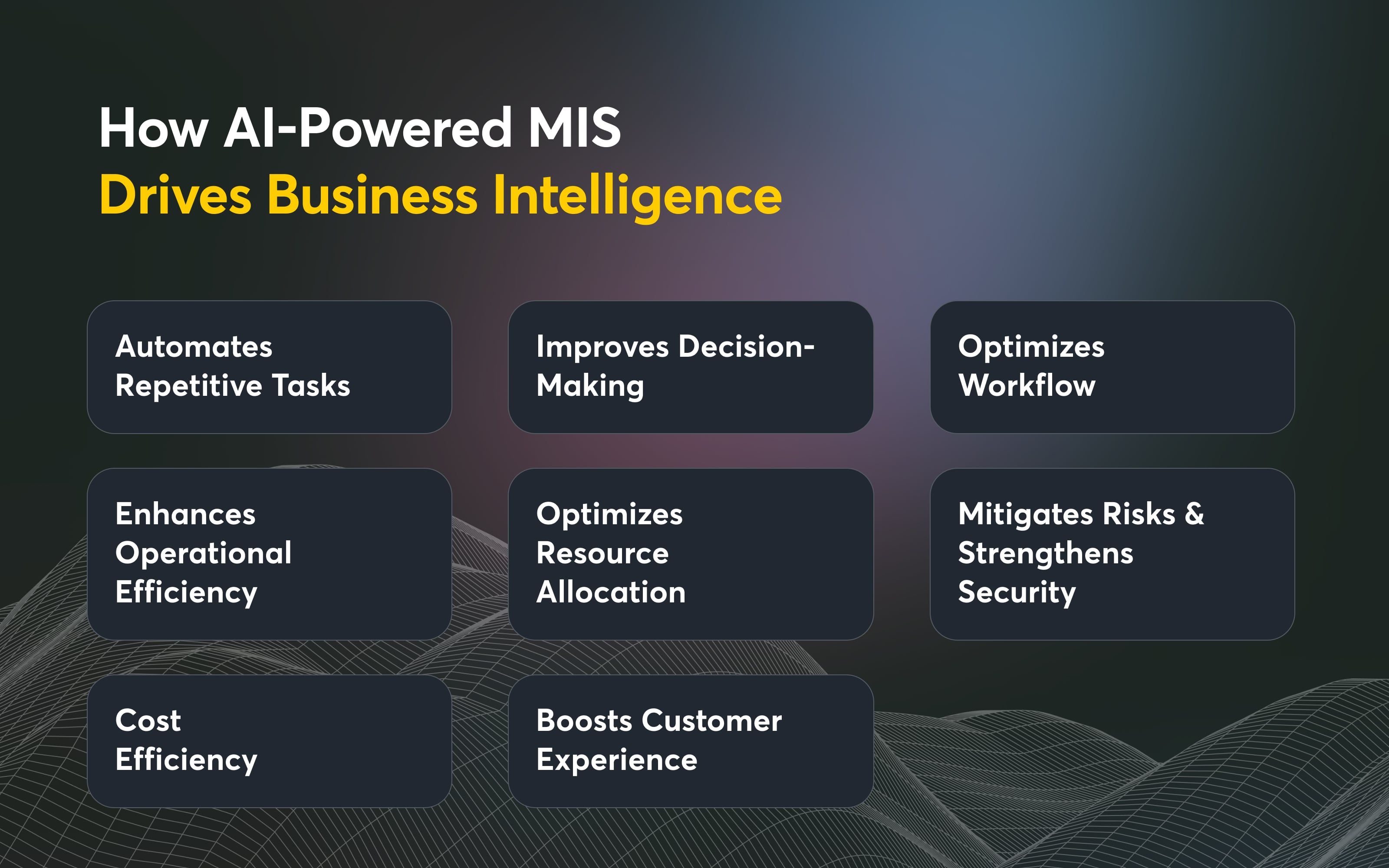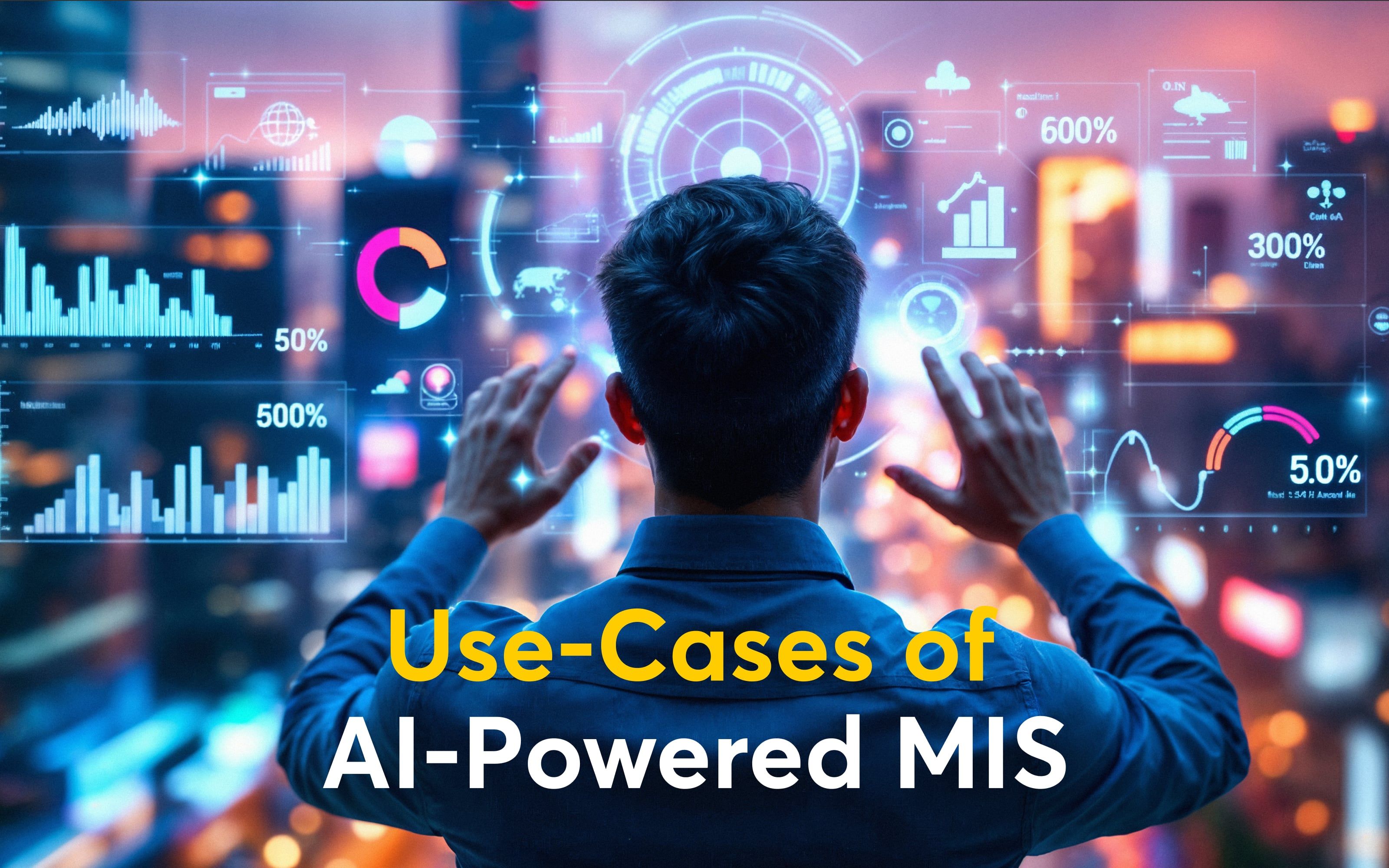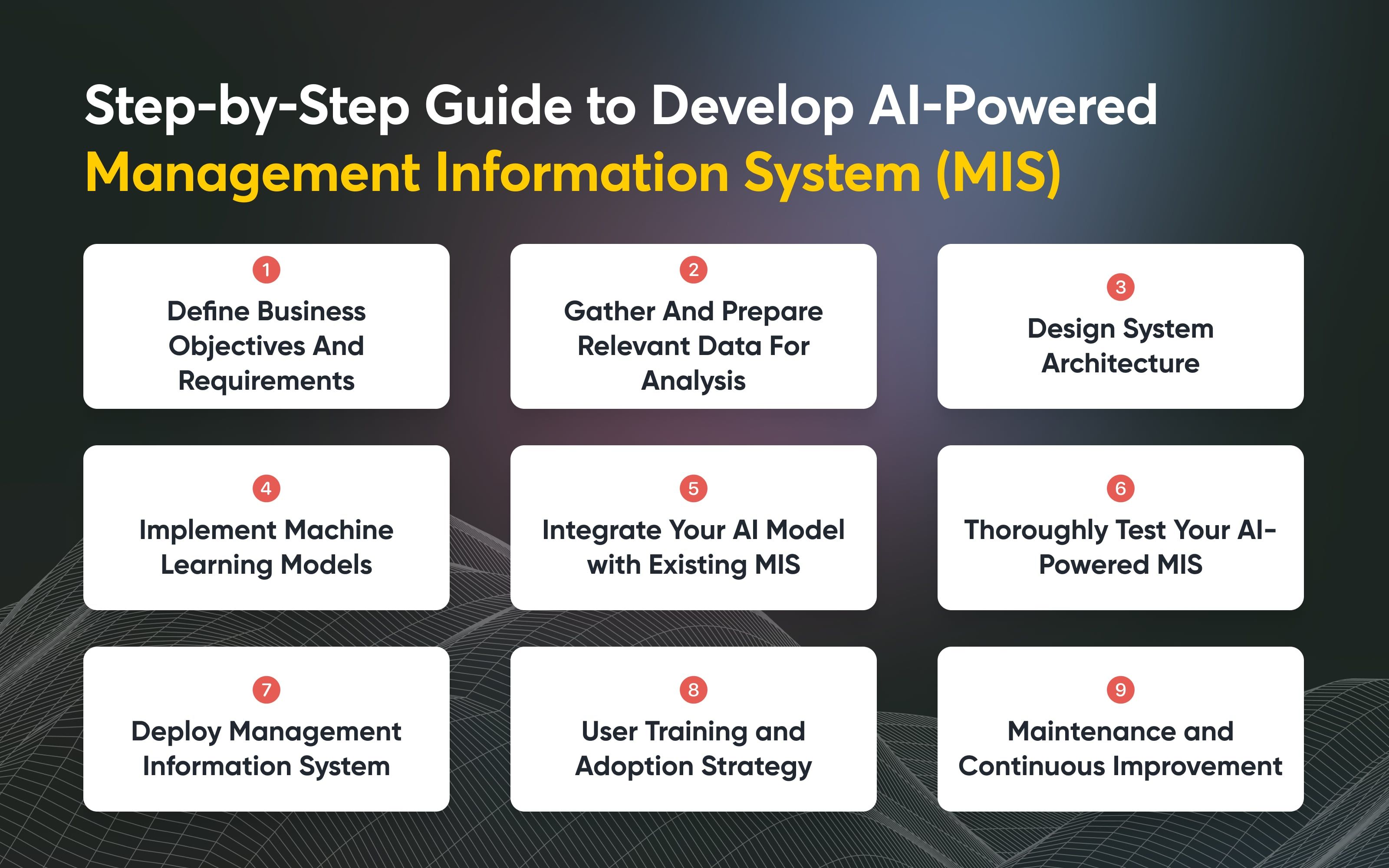With the growing demand and usage of data across various business operations, it's becoming increasingly important for businesses to invest in the development of a Management Information System (MIS). An MIS goes beyond merely gathering data—it allows you to analyze and interpret the data, empowering you to align decisions with your overall business objectives and drive long-term success.
However, to keep pace with the modern business landscape, you need to adopt AI and machine learning technology within your management information system. You might be wondering: Is this the only reason? To keep it short—developing a management information system powered by AI can unlock countless opportunities for your business. It streamlines operations, enables smarter, data-driven decisions, boosts employee productivity, and enables you to harness the full potential of your business data, proving to be a real game-changer!
To learn more, continue reading this blog post as we’ll explore what an AI-powered MIS is, its key benefits, and how it drives business intelligence for growth and success. Additionally, you’ll learn how to develop an AI-powered management information system.
What Is an AI-Powered MIS
An AI-powered Management Information System (MIS) combines traditional MIS capabilities with artificial intelligence to enhance decision-making, efficiency, and adaptability. Unlike conventional systems, AI-powered MIS leverages technologies like machine learning, natural language processing, and predictive analytics to process and analyze large volumes of data in real-time.
It’s a valuable asset for companies like yours who want to invest in AI technologies to streamline business operations and achieve outstanding results. What’s even more interesting is that the market size of Artificial Intelligence is expected to reach US$243.70bn in 2025.
Not only is AI useful for data analysis, but it’s also used to automate repetitive tasks, uncover patterns, and provide actionable insights. Overall, with AI-powered MIS, businesses can adapt to changing environments, optimize resource allocation, improve operational efficiency, and enhance customer experiences.
Key Aspects of AI-Powered Management Information System (MIS)

AI-powered MIS enhances traditional systems by incorporating intelligent features like automation, predictive analytics, and data security. It enables businesses to process and analyze vast datasets, uncover actionable insights, and make informed decisions. These systems drive efficiency, adaptability, and growth by addressing key areas like data analysis, quality, security, and sharing.
Data Analysis
AI-powered MIS leverages advanced algorithms to analyze large datasets, uncover patterns, and generate meaningful insights. This empowers businesses to make data-driven decisions, identify trends, and optimize processes for improved outcomes.
- Real-Time Data Processing and Analysis: Real-time capabilities allow AI-powered MIS to analyze data as it is generated, ensuring businesses respond swiftly to changes and opportunities. This fosters agility and informed decision-making.
- Predictive and Prescriptive Analytics: Predictive analytics anticipates future trends, while prescriptive analytics recommends actionable solutions. Together, they enable businesses to proactively address challenges and seize opportunities.
Data Quality
AI-powered MIS prioritizes data accuracy, consistency, and relevance, ensuring that the information businesses rely on is dependable. Automating tasks like data cleaning, validation, and deduplication, eliminates inconsistencies and errors. This reliable data forms the foundation for meaningful analysis and strategic decision-making, enabling organizations to operate more effectively and maintain a competitive edge in a data-driven environment.
Data Security
AI-powered MIS integrates advanced security features to protect sensitive data from threats. With tools like encryption, role-based access control, and real-time threat detection, it ensures data remains safe from breaches or unauthorized access. These systems also support compliance with regulatory standards, which enhances trust and minimizes risks. Businesses can confidently use AI-powered MIS to manage and secure their critical information assets.
Data Sharing
AI-powered MIS simplifies data sharing across departments and teams by enabling secure and streamlined processes. It ensures that stakeholders can access relevant data when needed without compromising security or integrity. This seamless collaboration enhances productivity, fosters innovation, and promotes alignment toward business goals. By facilitating unified access to critical information, AI-powered MIS empowers businesses to make informed decisions collectively and efficiently.
How AI-Powered Management Information System Drives Business Intelligence

AI-powered management information systems revolutionize how businesses approach data-driven strategies by enhancing intelligence, efficiency, and decision-making. These systems leverage AI capabilities to unlock transformative benefits across various areas of operations.
Automates Repetitive Tasks
One of the most valuable aspects of AI in your MIS is its ability to automate repetitive tasks like data entry, report generation, and basic analysis. By doing so, it reduces human errors and frees up time for your team to focus on more strategic activities. You can expect quicker turnaround times for routine tasks, ultimately speeding up the workflow and reducing operational costs.
Improves Decision-Making
AI-powered MIS empowers you to make better decisions by providing accurate, real-time data analysis. These systems evaluate complex datasets and deliver predictive insights that can guide your next business moves. According to a study, 75% percent of leaders believe that robust AI systems can significantly enhance their decision-making capabilities. Overall, you’ll also have the ability to model different scenarios, allowing for more informed decision-making and reducing the risk of costly errors.
Optimizes Workflow
Workflow optimization is key to business success, and an AI-driven MIS plays a crucial role. It helps pinpoint bottlenecks, inefficiencies, and areas for improvement by analyzing data from across your organization. With this intelligence, you can make adjustments in real-time, ensuring smoother operations. Your team can focus on more impactful work, as AI takes care of the groundwork, resulting in quicker project deliveries and more agile business practices.
Learn: AI Workflow Automation Best Practices in Enterprise
Enhances Operational Efficiency
Another key area where leveraging AI in MIS works wonders is automating processes and enhancing operational efficiency. AI-powered MIS significantly enhances efficiency across departments. From streamlining communication to automating scheduling, it reduces manual efforts while improving accuracy. The result is smoother operations and more efficient resource management, allowing your business to handle larger volumes of work without increasing overhead costs. As efficiency rises, so does the growth potential.
Optimizes Resource Allocation
AI-powered MIS uses predictive analytics to help you allocate resources more effectively. It evaluates historical data and forecasts future needs, ensuring that time, money, and personnel are assigned to projects with the greatest potential for success. This optimized allocation can lead to cost savings and increased returns on investments, as it ensures you’re directing resources where they’re most likely to deliver the highest value.
Cost Efficiency
AI systems are a key driver of cost efficiency within your organization. By automating processes, reducing errors, and optimizing resource usage, you cut down on operational overheads. The streamlined approach reduces waste and increases productivity, which in turn contributes to a more sustainable cost structure. Over time, the cumulative savings from these efficiencies can have a significant impact on your bottom line.
Boosts Customer Experience
Enhancing customer experience is a priority for businesses today, and AI-powered MIS enables you to do just that. Through advanced analytics, these systems provide deep insights into customer behavior, allowing you to deliver personalized interactions that meet their needs. Whether it's improving response times, offering personalized recommendations, or predicting future needs, AI helps you exceed customer expectations. Satisfied customers are more likely to become repeat buyers, improving your retention rates.
Mitigates Risks and Strengthens Security
AI-powered MIS enhances your ability to identify and mitigate risks by monitoring system activities in real-time. With AI’s threat detection capabilities, you can identify anomalies, security vulnerabilities, and potential fraud before they escalate. Additionally, AI helps ensure compliance with regulatory standards by continuously monitoring data usage and access. This proactive approach strengthens your security measures, minimizing the risk of breaches and protecting sensitive business information.
Use-Cases of AI-Powered Management Information Systems

1. Predictive Maintenance
With AI-powered MIS, you can analyze sensor data to predict equipment failures and schedule timely maintenance. Adopting this approach minimizes downtime, extends asset lifespans, and ensures seamless operations. It enhances productivity, reduces repair costs, and maintains efficiency across your organization. Predictive maintenance is essential for industries like manufacturing and logistics, where operational continuity is critical for success.
2. Customer Segmentation (CRM)
Using AI-driven MIS, you can segment customers based on demographics, behavior, and preferences. This helps you design personalized marketing campaigns that boost engagement and retention. Once you’ve captured data-driven insights using the MIS, you can more easily understand your audience better. What does it lead to? It leads to delivering a tailored user experience to meet their needs. With customer segmentation, you create targeted strategies that maximize ROI and strengthen relationships with your customers.
3. Fraud Detection (Financial Services)
With AI-enabled MIS, you can analyze transaction data to detect anomalies and identify fraudulent activities early. It’s one of the best ways to protect your business from financial losses and maintain customer trust. Additionally, these systems continuously learn and adapt, ensuring they stay ahead of emerging threats. Implementing AI in financial services enhances operational security and compliance with regulatory standards.
4. Demand Forecasting and Inventory Management (Sales & Marketing)
AI-powered MIS allows you to anticipate customer demand accurately and optimize inventory levels. Apart from this, what other benefits do you get? AI-driven forecasting provides real-time data, allowing you to respond quickly to changing market conditions and consumer needs. With an MIS that is smarter, you can dig into analyzing sales trends and market data, which ultimately reduces excess stock and prevents stockouts. All over, these insights ensure efficient supply chain management while improving customer satisfaction.
5. Employee Productivity Analysis (Human Resources)
Another use-case of MIS is in HR. Basically, with an AI-powered HRMIS, you can monitor employee performance and identify key areas for improvement. The benefits aren’t just limited to performance metrics; instead, an HRMIS enables you to analyze productivity metrics, reveal bottlenecks and inefficiencies, and provide actionable insights to implement targeted solutions. Guess what the outcome is: a more productive workforce, enhanced employee satisfaction, engagement, and overall organizational effectiveness.
6. Healthcare Decision Support (Healthcare)
AI-driven MIS transforms healthcare by analyzing patient data to predict outcomes and recommend personalized treatments. This system helps healthcare providers deliver timely and effective care while improving operational efficiency. By integrating real-time data, AI enhances decision-making, reduces errors, and ensures better resource allocation, ultimately enhancing patient outcomes and satisfaction.
7. Financial Forecasting (Finance)
With AI-powered MIS, you can achieve precise financial forecasting by analyzing revenue, expenses, and cash flow trends. These insights enable better financial planning and risk management. The system's ability to adapt to changing variables ensures long-term sustainability, helping you make informed decisions that drive growth and profitability. According to a survey, 80% of Financial Planning and Accounting teams are now able to make more frequent and accurate projections thanks to the assistance of AI tools.
8. Dynamic Pricing (E-commerce)
AI-enabled MIS empowers e-commerce platforms to optimize pricing strategies by analyzing market trends and competitor actions. The system dynamically adjusts prices to maximize profitability while ensuring competitiveness. This approach helps your businesses attract more customers, increase sales, and stay ahead in a fast-paced market environment.
Step-by-Step Guide to Develop AI-Powered Management Information System (MIS)
Now let’s move towards following the step-by-step guide to developing an AI-powered management information system.

Define Business Objectives And Requirements
The first to develop an AI-powered management information system is to begin by identifying your business goals, challenges, opportunities, and data needs. Discover the goal behind leveraging AI technology within your management information systems by identifying:
- What inefficiencies or challenges exist in your current management information system that AI can address?
- Which areas of your business would benefit the most from AI capabilities? Identify suitable use cases for AI within the MIS.
- How can an AI-powered MIS align with your business objectives and support your long-term goals?
- What key features and functionalities are essential for your AI-powered MIS to effectively meet your organization's needs?
- What specific insights do you want to uncover through AI-driven data analysis?
- What measurable objectives or KPIs will you use to evaluate the success of your AI-powered MIS implementation?
Overall, defining measurable objectives helps in creating the foundational step and direction for the system’s design and functionality, ensuring its effectiveness.
Gather And Prepare Relevant Data For Analysis
To develop an effective AI-powered MIS, start by collecting relevant data from various sources within your organization, such as databases, CRM systems, and external APIs. Focus on gathering comprehensive and accurate data that aligns with your business objectives. Once collected, ensure the data is clean and well-prepared. This involves removing duplicates, handling missing values, and standardizing formats to maintain consistency.
Preprocessing is crucial for ensuring the quality and relevance of the data for AI algorithms. Organize the data into structured formats that can be easily analyzed and processed. By investing time in proper data collection and preparation, you set a strong foundation for building a reliable and efficient AI-powered system.
Design System Architecture
Now, you need to design the system architecture to build an effective AI-powered MIS. Your design should prioritize speed, reliability, and security. A strong architecture ensures the seamless flow of data, supports analytics processes, and lays the groundwork for building advanced AI features into your MIS. For this, you need to:
- Map data flow to ensure smooth information processing and accessibility.
- Define integration points for systems like CRM, ERP, or external APIs.
- Design a user-friendly interface for intuitive data visualization and interaction.
- Select AI models tailored to business objectives, such as predictive or prescriptive analytics.
- Ensure scalability and flexibility to adapt to evolving business needs and technologies.
Overall, prioritizing these elements allows you to create a robust system that aligns with your business objectives and drives sustainable growth.
Implement Machine Learning Models
The main step in designing an AI-powered MIS is to develop machine learning models tailored to your business use cases. Use historical data to train these models, ensuring accuracy in predictions and recommendations. Validate the models to confirm their reliability.
These AI models enhance your MIS by enabling it to learn from data, adapt to new trends, and provide intelligent, proactive solutions for your business challenges. You can follow the best practices below to effectively implement and train your AI model:
- Define clear objectives to align your AI model with business goals.
- Use high-quality data to improve the accuracy of your AI model.
- Test and iterate frequently to refine your AI model's performance.
- Monitor performance regularly to maintain accuracy and effectiveness.
Discover: A Comprehensive Guide to AI Development LifeCycle
Integrate Your AI Model with Existing MIS
Once you’ve implemented the AI model, you need to integrate the AI models with existing MIS with your existing systems like CRM, ERP, or third-party applications. It’s vital for creating a unified and efficient platform. You need to establish seamless data flow between components to avoid silos and promote real-time data exchange. This integration ensures that the AI models can access comprehensive, accurate information to deliver actionable insights and predictions. Additionally, well-integrated systems improve operational efficiency, support better collaboration across teams, and enhance decision-making processes.
Let’s suppose, you’re developing an MIS for your ecommerce business, then you might need to integrate data from various sources like customer purchase history, website analytics, inventory management systems, and third-party marketplaces. Overall, connecting these data streams enables your AI-powered MIS to analyze customer behavior, predict demand trends, and optimize inventory levels in real-time.
Thoroughly Test Your AI-Powered MIS
What’s the next step now? After integrating your AI model with your existing MIS infrastructure, you must perform rigorous testing to ensure it operates effectively and reliably. You need to evaluate its functionality, performance, and security under diverse conditions to identify and fix potential issues.
Validate the AI model outputs to ensure that all integrated components work harmoniously. This step builds trust in the system’s capabilities and minimizes errors that could impact performance. Comprehensive testing is essential as it ensures your MIS delivers accurate insights and performs seamlessly in a live environment.
Deploy Your Management Information System
Once you’ve done with the testing, you’re now all set to deploy your AI-powered MIS into a live environment. Monitor its initial performance closely to detect and resolve issues quickly to minimize disruptions to your business operations. A phased deployment approach can help mitigate risks by rolling out features incrementally and allowing time for adjustments.
Once deployed, ensure the system aligns with user expectations and business goals. Regularly communicate updates and gather feedback during this phase to address immediate challenges. A successful deployment sets the stage for the MIS to deliver valuable insights and optimize your processes, driving efficiency and improved decision-making.
User Training and Adoption Strategy
Training users to utilize the AI-powered MIS effectively is crucial for its success. Design comprehensive training programs, including hands-on sessions, user guides, and support materials, to familiarize employees with the system’s features. Encourage user feedback to identify pain points and refine the system’s functionality. Highlight the system’s benefits to motivate adoption and demonstrate how it aligns with daily workflows.
Continuous engagement, such as workshops and Q&A sessions, can ensure users feel confident and supported. By addressing user concerns and promoting collaboration, you can ensure the MIS becomes an indispensable tool that improves productivity and streamlines decision-making processes.
Maintenance and Continuous Improvement
After successfully deploying your MIS to live production, it’s essential to regularly maintain your AI-powered MIS to ensure it operates efficiently over time. Regularly update AI models to improve accuracy and address changing business needs. Monitor the system for bugs or performance issues and implement timely fixes.
Continuously gather user feedback to enhance usability and add new features. Stay proactive in adopting technological advancements to ensure your system remains competitive and scalable.
Maintenance also involves compliance checks to meet regulatory standards and security updates to protect data integrity. By committing to continuous improvement, your MIS evolves alongside your organization, delivering consistent value and adapting to future challenges effectively.
Ending Notes
AI-powered Management Information Systems looks like a fancy term but in reality, it’s transforming the way businesses operate. It provides valuable insights and enhances decision-making along with other capabilities. These systems help businesses automate repetitive tasks, predict trends, and optimize processes, resulting in improved operational efficiency and cost savings. AI-powered MIS enables companies to offer personalized customer experiences, forecast demand accurately, and detect fraud in real time, boosting overall performance.
Moreover, by analyzing vast amounts of data, AI empowers businesses to make data-driven decisions that were previously unimaginable. As organizations continue to embrace AI-powered MIS, the technology will remain crucial in maintaining a competitive edge, driving growth, and ensuring long-term sustainability in an ever-evolving business landscape.


